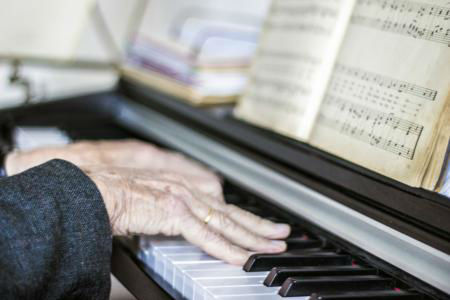On music and memory
The human relationship with music is mysterious. Many professional songwriters struggle to describe where their inspiration comes from, often simply attributing it to a mystical creative source. In "Alive Inside," a recent documentary about music and the aging brain, filmmaker Michael Rossato-Bennett traces our natural affinity for music back to the moment when the first cell of the human heart starts to beat in its embryonic state. This single cellular beat is followed by a proliferation of other cells that learn to beat in unison. A nascent sense of musical rhythm is established long before our brains even begin to develop.
The primary focus of "Alive Inside" is on the profound impact of music on seniors coping with memory loss. The first scene in the film introduces viewers to a 94-year old woman who is struggling to describe her childhood. The woman pauses, looks frustrated, then explains that she can't remember anything. "I've been on this earth 90 years," she says sadly, "I've lost so much."
At this point, the interviewer asks the woman, "Would you like to listen to some music?"
He helps the woman put on a pair of headphones, and shows her how to press the "play" button on the attached iPod. Seconds later, her face brightens as she recognizes the song: "When The Saints Go Marching In" performed by Louis Armstrong. "I haven't listened to this since I was a little girl," she nods vigorously to the music. Soon the memories come flooding in. "My parents did not want us listening to this kind of music when we were growing up..."
Music has been known to unlock memories and assist with learning new information, but only recently has it been explored in the context of the aging brain. Dan Cohen, a social worker featured in the film, is so confident in the effectiveness of music as a cognitive enhancer that he began his own foundation, "Music and Memory." The foundation's goal is to raise money to equip seniors residing in skilled nursing facilities throughout the country with access to their favorite music (www.musicandmemory.org).
A 2010 study at Boston University suggested that music, rather than medication, might help people with short-term memory loss learn new information. A neuropsychologist named Brandon Ally studied two groups of seniors. One group had been diagnosed with dementia. The other group was cognitively healthy. The participants were asked to remember information that was relayed to them in a variety of ways -- printed, spoken, and sung. The researchers found that the participants from both groups retained the most information when they received it through song. The big take-away from this study was that cognitive status did not alter this trend: even after the effects of dementia had set in, music continued to stimulate and improve memory.
While listening to music is great for the aging brain, performing music may be even better. Nina Kraus, from the Auditory Neuroscience Laboratory at Northwestern University, designed a study that studied the brains of musicians and non-musicians, both young and old. Her research team attached electrodes to the heads of 87 participants, for the purpose of tracking their memory and sound processing skills. If a participant was eating dinner with a friend in a crowded restaurant, the electrodes would measure how quickly the individual processed his or her friend's voice through the clamor of surrounding noises.
The two main factors in the experiment were age and musical experience. Half of the participants had considerable musical training and a lifetime of experience performing music, while the other half had little or no experience as musicians. Musical experience turned out to be more important than age when it came to understanding and remembering sounds. The musicians, no matter how old they were, were found to have stronger memories and stronger sound processing skills.
According to Kraus, musicians "get very good at pulling out important information from a complex soundscape...that involves hearing, but it's related to how quickly you can process information and how well you remember it."
If your relationship with music has waned over the years, consider rekindling it. In addition to being good for the brain, music is enjoyable in its own right. At best, musical experiences are profoundly fulfilling on an emotional and spiritual level. As of yet, there is no medication out there with a comparable range of benefits.
Adam Johnson writes for Youville Assisted Living Residences, member of Covenant Health Systems, a Catholic, multi-institutional health and elder care organization serving New England.
- Adam Johnson writes for Youville Assisted Living Residences, member of Covenant Health Systems, a Catholic, multi-institutional health and elder care organization serving New England.



















